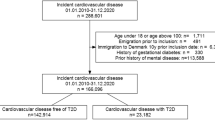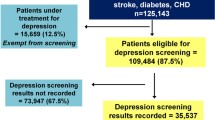Abstract
OBJECTIVE: The prevalence of major depression is approximately 2-fold higher in patients with diabetes mellitus compared to medical controls. We explored the association of major depression with 8 cardiac risk factors in diabetic patients with and without evidence of cardiovascular disease (CVD).
DESIGN: A mail survey questionnaire was administered to a population-based sample of 4,225 patients with diabetes to obtain data on depression status, diabetes self-care (diet, exercise, and smoking), diabetes history, and demographics. On the basis of automated data we measured diabetes complications, glycosylated hemoglobin, medical comorbidity, low-density lipid levels, triglyceride levels, diagnosis of hypertension, and evidence of microalbuminuria. Separate analyses were conducted for subgroups according to the presence or absence of CVD.
SETTING: Nine primary care clinics of a nonprofit health maintenance organization.
MAIN RESULTS: Patients with major depression and diabetes were 1.5- to 2-fold more likely to have 3 or more cardiovascular risk factors as patients with diabetes without depression (62.5% vs 38.4% in those without CVD, and 61.3% vs 45% in those with CVD). Patients with diabetes without CVD who met criteria for major depression were significantly more likely to be smokers, to have a body mass index (BMI) ≥ 30 kg/m2, to lead a more sedentary lifestyle, and to have HbA1c levels of >8.0% compared to nondepressed patients with diabetes without heart disease. Patients with major depression, diabetes, and evidence of heart disease were significantly more likely to have a BMI ≥30 kg/m2, a more sedentary lifestyle, and triglyceride levels >400 mg/dl than nondepressed diabetic patients with evidence of heart disease.
CONCLUSIONS: Patients with major depression and diabetes with or without evidence of heart disease have a higher number of CVD risk factors. Interventions aimed at decreasing these risk factors may need to address treatment for major depression in order to be effective.
Similar content being viewed by others
References
Kannel W, McGee D, Gordon T. A general cardiovascular risk profile: the Framingham Study. Am J Cardiol. 1976;38:46–51.
Strike P, Steptoe A. Depression, stress and the heart. Heart. 2002;88:441–3.
Hemingway H, Marmot M. Evidence based cardiology: psychosocial factors in the aetiology and prognosis of coronary artery disease. BMJ. 1999;318:1460–7.
Rugulies R. Depression as a predictor for coronary heart disease. A review and meta-analysis. Am J Prev Med. 2002;23:51–61.
Frasure-Smith, Lesperance F, Talajic M. Depression and 18-month prognosis after myocardial infarction. Circulation. 1995;91:999–1005.
Clouse R, Freedland K, Carney R, Griffith L, Lustman P. Depression accelerates the presentation of coronary heart disease (CHD) in women with diabetes mellitus. Psychosom Med. 2001;63:103.
Black S, Markides K, Ray L. Depression predicts increased incidence of adverse death outcomes in older Mexican-Americans with type 2 diabetes. Diabetes Care. 2003;26:2822–8.
Kinder L, Kamarck T, Baum A, Orchard T. Depressive symptomatology and coronary heart disease in type 1 diabetes mellitus. A study of possible mechanisms. Health Psychol. 2002;21:542–52.
Beck A, Steer R, Garbin M. Psychometric properties of the Beck Depression Inventory: twenty-five years of evaluation. Clin Psychol Rev. 1998;8:77–100.
Glassman A, Helzer J, Covey L, et al. Smoking, smoking cessation and major depression. JAMA. 1990;264:1583–4.
Goodman E, Whitaker R. A prospective study of the role of depression in the development and persistence of adult obesity. Pediatrics. 2002;110:497–504.
Pine D, Goldstein R, Wolk S, Weissman M. The association between childhood depression and adulthood body mass index. Pediatrics. 2001;107:1049–55.
Steptoe A, Wardle J, Fuller R, et al. Leisure-time physical exercise: prevalence, attitudinal correlate and behavior correlates among young Europeans from 21 countries. Prev Med. 1997;26:845–54.
Rajala U, Uusimaki A, Keinanen-Kiukaanniemi S, Kivela SL. Prevalence of depression in a 55-year-old Finnish population. Soc Psychiatry Psychiatr Epidemiol. 1994;29:126–30.
DiMatteo MR, Lepper HS, Croghan TW. Depression is a risk factor for noncompliance with medical treatment: meta-analysis of the effects of anxiety and depression on patient adherence. Arch Intern Med. 2000;160:2101–7.
Gorman J, Sloan R. Heart rate variability in depressive and anxiety disorders. Am Heart J. 2000;140(suppl 4):S77-S83.
Langhrissi-Thode F, Wagner W, Pollock B, Johnson P, Finkel M. Elevated platelet factor 4 and beta-thromoglobin plasma levels in depressed patients with ischemia heart disease. Biol Psychiatry. 1997;42:290–5.
Musselman D, Tomer A, Manatunga A, et al. Exaggerated platelet reactivity in major depression. Am J Psychiatry. 1996;153:1313–7.
Konsman J, Parret J, Dantzer R. Cytokine-induced sickness behavior: mechanisms and implications. Trends Neurosci. 2002;25:154–9.
Katon W, Von Korff M, Lin E, et al. Improving primary care treatment of depression among patients with diabetes mellitus: the design of the Pathways Study. Gen Hosp Psychiatry. 2003;25:158–68.
McCulloch D, Price M, Hindmarsh M, Wagner E. A population-based approach to diabetes management in a primary care setting: early results and lessons learned. Eff Clin Pract. 1998;1:12–22.
Spitzer R, Kroenke K, Williams J. Validation and utility of a self-report version of PRIME-MD: the PHQ primary care study. Primary Care Evaluation of Mental Disorders: Patient Health Questionnaire. JAMA. 1999;282:1737–44.
Kroenke K, Spitzer RL, Williams JBW. The PHQ-9: validity of a brief depression severity measure. J Gen Intern Med. 2001;16:606–13.
Stevens R, Kothari V, Adler A, Stratton I, Holman R. The UKPDS Risk Engine: a model for the risk of coronary artery disease in type 2 diabetes (UKPDS 56). Clin Sci. 2001;101:671–9.
Folsom A, Chambless L, Duncan B, Gilbert A, Pankow J. Prediction of coronary heart disease in middle-aged adults with diabetes. Diabetes. 2003;26:2777–84.
Toobert DJ, Hampson SE, Glasgow RE. The summary of diabetes self-care activities measure: results from 7 studies and a revised scale. Diabetes Care. 2000;23:943–50.
American Diabetes Association. Management of dyslipidemia in adults with diabetes. Diabetes Care. 2003;26(suppl 1):S83-S86.
American Diabetes Association. Standards of medical care for patients with diabetes mellitus. Diabetes Care. 2002;25(suppl 1):S33-S42.
Fishman P, Goodman M, Hornbrook M, Meenan RT, Bachman DJ, O’Keefe Rosetti MC. Risk adjustment using automated pharmacy data: the Rx Risk model. Med Care. 2003;41:84–99.
Starfield B, Weiner J, Mumford L, Steinwachs D. Ambulatory care groups: a categorization of diagnoses for research and management. Health Serv Res. 1991;26:53–74.
Selby J, Karter A, Ackerson L, Ferrara A, Lia J. Developing a prediction rule from automated clinical databases to identify high-risk patients in a large population with diabetes. Diabetes Care. 2001;24:1547–55.
SAS/Statistics Software. Changes and Enhancements. SAS Technical Release. Cary, NC: SAS Institute, Inc.; 1994.
Wassertheil-Smoller S, Shumaker S, Ockene J, et al. Depression and cardiovascular sequelae in post-menopausal women: The Women’s Health Initiative. Arch Intern Med. 2004;164:289–98.
Pitsavos C, Chrysohoou C, Panagiotakos D, et al. Association of leisure-time physical activity on inflammatory markers (C-reactive protein, white blood cell count, amyloid A, fibrinogen) in health subjects (from the Attica study). Am J Cardiol. 2003;91:368–70.
Kessler R, McGonagle K, Zhao S, et al. Lifetime and 12-month prevalence of DSM III-R psychiatric disorders in the United States. Results from the National Comorbidity Study. Arch Gen Psychiatry. 1994;51:8–19.
Anderson R, Freedland K, Clouse R, Lustman P. The prevalence of comorbid depression in adults with diabetes: a meta-analysis. Diabetes Care. 2001;24:1069–78.
Gu K, Cowil C, Harris M. Diabetes and decline in heart disease mortality in U.S. adults. JAMA. 1999;281:1291–7.
Raza A, Movahed A. Current concepts of cardiovascular diseases in diabetes mellitus. Int J Cardiol. 2003;89:123–34.
Blendea M, McFarlane I, Isernovic E, Gick G, Sowers J. Heart disease in diabetic patients. Curr Diab Rep. 2003;3:233–9.
Patton G, Carlin J, Coffey C, Wolfe R, Hibbert M, Bowes G. Depression, anxiety, and smoking initiation: a prospective study over 3 years. Am J Public Health. 1998;88:1518–22.
Anda R, Williamson D, Escobedo L, Most E, Gioviro G, Remington P. Depression and dynamics of smoking. JAMA. 1990;264:1541–3.
Blumenthal J, Williams R, Wallace A, Williams R, Needles T. Physiological and psychological variables predict compliance to prescribed exercise in patients recovering from myocardial infarction. Psychosom Med. 1982;44:519–27.
Marcus M, Wing R, Guare J, Blaire E, Jawad A. Lifetime prevalence of major depression and its effect on treatment outcome in obese type 2 diabetic patients. Diabetes Care. 1992;15:253–5.
Ciechanowski P, Katon W, Russo J. Depression and diabetes: impact of depression symptoms on adherence, function and costs. Arch Intern Med. 2000;160:3278–85.
Carney R, Freedland K, Eisen S, Rich M, Skala J, Jaffe A. Adherence to a prophylactic medication regimen in patients with symptomatic versus asymptomatic ischemic heart disease. Behav Med. 1998;24:35–9.
Sobol AB, Watala C. The role of platelets in diabetes-related vascular complications. Diabetes Res Clin Pract. 2000;50:1–16.
Collier A, Tymkewycz P, Armstrong R, Young RJ, Jones RL, Clarke BF. Increased platelet thromboxane receptor sensitivity in diabetic patients with proliferative retinopathy. Diabetologia. 1986;29:471–4.
Frohlich M, Imhof A, Berg G, et al. Association between C-reactive protein and features of the metabolic syndrome: a population-based study. Diabetes Care. 2000;23:1835–9.
Broadley A, Korzun A, Jones C, Freeneaux M. Arterial dysfunction is impaired in treated depression. Heart. 2002;88:521–3.
Cohen RA. Dysfunction of the vascular endothelium in diabetes mellitus. Circulation. 1993;87(suppl):V67-V76.
Author information
Authors and Affiliations
Corresponding author
Additional information
This work was supported by grants MH41739 and MH016473 from the National Institute of Mental Health Services Division, Bethesda, Md (Dr. Katon).
Rights and permissions
About this article
Cite this article
Katon, W.J., Lin, E.H.B., Russo, J. et al. Cardiac risk factors in patients with diabetes mellitus and major depression. J GEN INTERN MED 19, 1192–1199 (2004). https://doi.org/10.1111/j.1525-1497.2004.30405.x
Issue Date:
DOI: https://doi.org/10.1111/j.1525-1497.2004.30405.x




